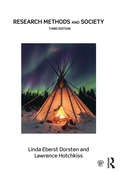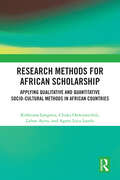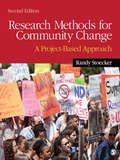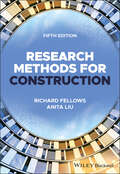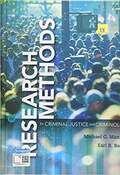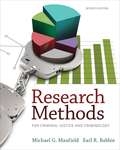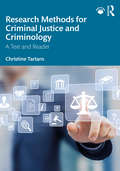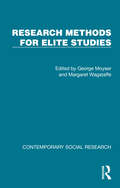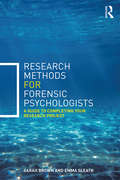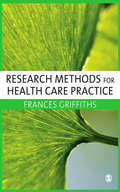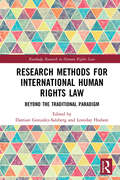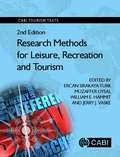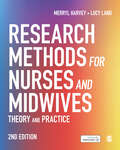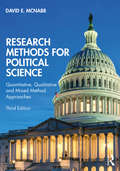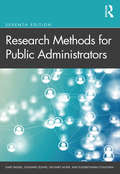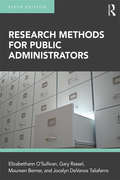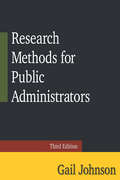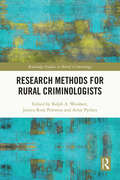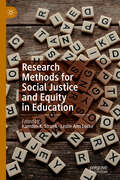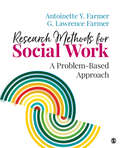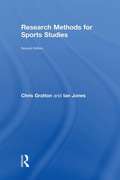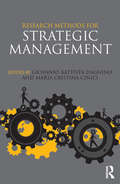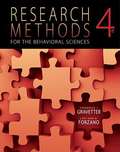- Table View
- List View
Research Methods and Society: Foundations of Social Inquiry
by Lawrence Hotchkiss Linda Eberst DorstenResearch Methods and Society, Third Edition is designed to help undergraduate students acquire basic skills in methods of social science research. These skills provide a foundation for understanding research findings in the social sciences and for conducting social research. Just as important, such skill-sets and principles can be applied to everyday situations to make sense of the endless stream of claims and counterclaims confronted daily in print and electronic forms, including social media. Key features of this book include: Straightforward prose, including key concepts and tools. Concrete and everyday examples and "hands-on" practice activities and Applications designed to be interesting and useful to students. Organization to accommodate term-length research projects. Chapter Summaries and Review Sheets. Assignments to meet specific learning goals: Evaluation of key excerpts from research reports published in professional journal articles and popular press. Analysis of secondary data (e.g., from the General Social Survey). Analysis of primary data from mini–research projects. Combinations of methods applications using more than one activity (e.g., evaluating published reports and completing secondary data analysis or mini-projects). New to Third Edition: New chapter, "Ethics and Social Science Research." Many new and updated citations, including from international sources. References to Internet survey tools and software: how to find data online, what to consider, and how to choose. References to noteworthy, informative media from online sources (e.g., Annenberg Learning, universities, weblogs, YouTube). Supplemental Instructor Materials: Instructor’s Manual, Test Bank, PowerPoint presentations.
Research Methods for African Scholarship: Applying Qualitative and Quantitative Socio-cultural Methods in African Countries
by Chuka Onwumechili Kehbuma Langmia Laban Ayiro Agnes Lucy LandoThis book spotlights and demystifies under-researched elements of research design to support successful research initiatives undertaken by students in African universities.This volume marks a significant and important departure from research design books rooted in European and American socio-cultural context and places emphasis on contextual realities in Africa. Attending to socio-cultural oral and written methods of eliciting data from participants, contextual sampling techniques, oral and third-party open ended survey instrumentation, and multi-pronged data analysis schemes that emphasize ontological, epistemological, and axiological findings, these chapters constitute a novel and much-needed focus on realities and examples from the continent of Africa.Written by African scholars, the book will appeal to post-graduate students and early-career scholars and researchers with interests in research methods across the social sciences.
Research Methods for Community Change: A Project-Based Approach
by Dr Randy R. StoeckerResearch Methods for Community Change: A Project-Based Approach, Second Edition is an in-depth review of all of the research methods that communities can use to solve problems, develop their resources, protect their identities, and build power. With an engaging writing style and numerous real world examples, Randy Stoecker shows how to use a project-based research model in the community to: diagnose a community condition; prescribe an intervention for the condition; implement the prescription; and evaluate its impact. At every stage of this model there are research tasks, from needs and assets assessments to process and outcome studies. Readers also learn the importance of involving community members at every stage of the project and in every aspect of the research, making the research part of the community-building process.
Research Methods for Construction
by Richard F. Fellows Anita M. LiuThe new and enhanced edition of the popular textbook on research methods in construction and related disciplines Research Methods for Construction is designed to help construction students develop the research skills needed to achieve success in their research projects. Providing clear guidance on research formulation, methodologies, and methods, this comprehensive textbook addresses the theoretical, philosophical, and practical aspects of research in many areas of construction. The authors explain the requirements for data and analysis and describe the methods used for scientific and engineering experiments, modelling and simulations, research on management and socio-economic issues, and more. Now in its fifth edition, Research Methods for Construction is fully revised to reflect contemporary developments and emerging areas of construction research. New and expanded chapters cover topics including data protection and ethics, theory borrowing, sensemaking, and directionally motivated reasoning. This edition includes additional models and details relating to translation, and offers fresh discussion of axiology, determinism, and stochasticism. Providing students with coherent, well-structured account of construction research, this market-leading textbook: Emphasizes and instils rigor into construction students' problem-solving, reports, and publications Assists researchers in selecting appropriate methods to execute research Articulates the stages of construction research processes: producing a proposal, executing the research, and reporting the results Examines qualitative and quantitative approaches and statistical considerations for a wide range of construction research Discusses current ethical, legal, and regulatory issues pertaining to research in construction The fifth edition of Research Methods for Construction is the ideal textbook for advanced undergraduate and postgraduate students embarking on a research project, at bachelors, masters or doctoral level, in construction, surveying, architecture, civil engineering, and other built environment disciplines.
Research Methods for Criminal Justice and Criminology (MindTap Course List Ser.)
by Earl R. Babbie Michael G. MaxfieldYou'll feel like an actual participant in the research process with this bestseller's unique over-the-shoulder vantage point and practical, example-filled discussions drawn from various facets of criminal justice research. Prominent criminologist Michael G. Maxfield and acclaimed research methods author Earl Babbie guide you in effectively applying research methods to the study of crime and criminal justice policy. Conversational and learner-friendly, RESEARCH METHODS FOR CRIMINAL JUSTICE AND CRIMINOLOGY includes many study tools, examples, and exercises to help you do well on exams and excel in this course.
Research Methods for Criminal Justice and Criminology 7th Edition
by Earl R. Babbie Michael G. MaxfieldProviding an introduction to criminal justice research and enhanced by examples, research, applications, and built-in study tools, this book focuses on helping readers to do research.
Research Methods for Criminal Justice and Criminology: A Text and Reader
by Christine TartaroThis book explains and illustrates criminal justice research topics, including ethics in research, research design, causation, operationalization of variables, sampling, methods of data collection (including surveys), reliance on existing data, validity, and reliability. For each approach, the book addresses the procedures and issues involved, the method’s strengths and drawbacks, and examples of actual research using that method. Every section begins with a brief summary of the research method. Introductory essays set the stage for students regarding the who, what, when, where, and why of each research example, and relevant discussion questions and exercises direct students to focus on the important concepts. Research Methods for Criminal Justice and Criminology: A Text and Reader features interesting and relevant articles from leading journals, which have been expertly edited to highlight research design issues. The text offers instructors a well-rounded and convenient collection that eliminates the need to sift through journals to find articles that illustrate important precepts. All articles are recent and address issues relevant to the field today, such as immigration and crime, security post-9/11, racial profiling, and selection bias in media coverage of crime. The book encourages classroom discussion and critical thinking and is an essential tool for undergraduate and graduate research methods courses in criminal justice, criminology, and related fields.
Research Methods for Elite Studies (Contemporary Social Research)
by George Moyser Margaret WagstaffeElites are crucial groups of people in all but the very simplest societies. Whether one is concerned with politics and government, the economy, or the wider culture and structure of society, they are the people who occupy the central positions of influence that, in turn, enable them to help shape the character and direction of the whole society.But who exactly are they, and how does one study them? In sharp contrast to the ordinary citizenry, the methodology for the study of elites was contentious and under-developed at the time. Originally published in 1987, Research Methods for Elite Studies provided a wide-ranging survey of the techniques, problems, issues and practicalities of elite research. These are explored through case studies conducted by a range of experts, all personally involved in the field of elite research about which they write. Methodology here is not divorced from substance, but vividly set in its context by the researchers.Research Methods for Elite Studies is directed to all social scientists who seek to understand the working of the powerful in society. In particular, those concerned with political power, with the functioning of social and political institutions, with economic enterprises, and above all with the diverse variety of leaders in society, will find the volume essential reading.
Research Methods for Forensic Psychologists: A guide to completing your research project
by Sarah Brown Emma SleathResearch Methods for Forensic Psychologists is an accessible and comprehensive textbook that introduces students to the research process in forensic psychology. Adopting a problem-based learning approach, this book offers a ‘how-to’ guide to the whole research process and empowers readers to develop their own programme of research, from initial vague ideas, to developing a research question, to carrying out a methodologically rigorous research project, to disseminating the findings. The text is centred on five case studies, sufficiently different in nature to address the most common research methodologies. Each case study is linked with a specific research question that will be used to illustrate the research process throughout the rest of the book. Topics covered in the book include: Design and Planning, including a literature search, a discussion of different sorts of data, practical and feasibility issues, research ethics and developing a research proposal. Conducting research, including the submission of ethics proposals and responding to feedback, collecting data and dealing with the problems and challenges of analysing data. Dissemination of findings, an overview of the different types of papers, with examples listed and other methods of disseminating findings discussed, such as conference presentations and the use of social media. Throughout, issues of common difficulty or confusion are highlighted and activities are provided for readers to consider and apply the information discussed further. Additional reading sections and summaries are also provided at the end of each chapter. This book is essential reading for advanced students in Forensic Psychology, as well as trainees and practitioners within relevant forensic psychology organisations.
Research Methods for Health Care Practice
by Frances GriffithsMany health professionals want to investigate their health care practice and how it could be improved to benefit their patients. This book introduces the range of research approaches available, and explains what can be achieved with different methods and how they can compliment each other. Research Methods for Health Care Practice guides the researcher through their journey, giving detailed, step-by-step advice on planning and carrying out each stage of the research. Useful examples from health care research are included throughout to illustrate the application of the techniques and methods discussed. The book provides discussion of all the key issues and stages of research, including: - user involvement in research - research ethics - deciding on a research approach - data collection and analysis methods Research Methods for Health Care Practice is ideal for professionals wanting to undertake research in their own health care setting, and will be of use to any students undertaking a research project as part of their course in health and related fields.
Research Methods for International Human Rights Law: Beyond the traditional paradigm (Routledge Research in Human Rights Law)
by Loveday Hodson Damian Gonzalez-SalzbergThe study and teaching of international human rights law is dominated by the doctrinal method. A wealth of alternative approaches exists, but they tend to be discussed in isolation from one another. This collection focuses on cross-theoretical discussion that brings together an array of different analytical methods and theoretical lenses that can be used for conducting research within the field. As such, it provides a coherent, accessible and diverse account of key theories and methods. A distinctive feature of this collection is that it adopts a grounded approach to international human rights law, through demonstrating the application of specific research methods to individual case studies. By applying the approach under discussion to a concrete case it is possible to better appreciate the multiple understandings of international human rights law that are missed when the field is only comprehended though the doctrinal method. Furthermore, since every contribution follows the same uniform structure, this allows for fruitful comparison between different approaches to the study of our discipline.
Research Methods for Leisure, Recreation and Tourism
by William E. Hammitt Ercan Sirakaya-Turk Jerry J. Vaske Muzaffer S. UysalDescribing the fundamental elements of research methods for leisure, recreation and tourism, this new edition of a popular textbook is updated throughout. It covers the measurement of variables, sampling, questionnaire design and evaluation methods, and also a wider discussion of writing proposals, communicating research findings, cross-cultural research, and the use of new technologies in conducting research. This new edition includes: * New and expanded material on visual research methods, non-parametric tests and sampling to encompass growing areas of research interest; * Pedagogical features and extra citations to create a cohesive learning experience for students; and * Numerous examples from tourism and recreation literature in every chapter, tying theory into scenarios students could face in their careers. Written by internationally renowned researchers in an accessible style, this book introduces both undergraduate and graduate students to the vital skills they will need to succeed in the leisure, recreation, tourism and hospitality industries.
Research Methods for Nurses and Midwives: Theory and Practice
by Lucy Land Merryl HarveyThis book walks you step-by-step through the whole research process so you can get up to speed understanding and doing your own research. In their friendly, down to earth style, the authors lay the theoretical foundations you need to consume and critique research, before showing how to translate this into action when tackling your own literature review or research project. This second edition: Draws on a wealth of examples from midwifery, four fields of nursing including mental health nursing and child nursing, and a range of health care specialities. Covers new and updated NMC professional education standards and maps all relevant policy and law. Supports your learning with reflective exercises, online activities and quizzes that enable you to be confident in your understanding and develop your thinking. Whether you’re encountering research and evidence-based practice for the first time or refreshing your methods knowledge, this is the ideal research companion for nurses and midwives pre-registration, post-registration and beyond.
Research Methods for Nurses and Midwives: Theory and Practice
by Lucy Land Merryl HarveyThis book walks you step-by-step through the whole research process so you can get up to speed understanding and doing your own research. In their friendly, down to earth style, the authors lay the theoretical foundations you need to consume and critique research, before showing how to translate this into action when tackling your own literature review or research project. This second edition: Draws on a wealth of examples from midwifery, four fields of nursing including mental health nursing and child nursing, and a range of health care specialities. Covers new and updated NMC professional education standards and maps all relevant policy and law. Supports your learning with reflective exercises, online activities and quizzes that enable you to be confident in your understanding and develop your thinking. Whether you’re encountering research and evidence-based practice for the first time or refreshing your methods knowledge, this is the ideal research companion for nurses and midwives pre-registration, post-registration and beyond.
Research Methods for Political Science: Quantitative, Qualitative and Mixed Method Approaches
by David E. McNabbThe third edition of Research Methods for Political Science retains its effective approach to helping students learn what to research, why to research and how to research. The text integrates both quantitative and qualitative approaches to research in one volume and covers such important topics as research design, specifying research problems, designing questionnaires and writing questions, designing and carrying out qualitative research and analyzing both quantitative and qualitative research data. Heavily illustrated, classroom tested, exceptionally readable and engaging, the text presents statistical methods in a conversational tone to help students surmount "math phobia." Updates to this new edition include: Research topics chapters have been upgraded and expanded. Two mixed methods design chapters have been added. A new chapter on hermeneutic analysis designs and research with large data sets. The chapter on multivariate statistics has been expanded, with an expanded discussion on logistic regression. Tools on how to prepare and present research findings are now featured in the appendix, allowing instructors more flexibility when teaching their courses. Research Methods for Political Science will give students the confidence and knowledge they need to understand the methods and basics skills for data collection, presentation and analysis.
Research Methods for Public Administrators
by Elizabethann O'Sullivan Gary Rassel Zachary Mohr Suzanne LelandResearch Methods for Public Administrators contains a thorough overview of research methods and statistical applications for advanced undergraduate and graduate students, and practitioners. The material is based on established social science methods. Concepts and applications are discussed and illustrated with examples from actual research. The book covers research design, methods of data collection, instructions on formulating research plans, measurement, sampling procedures, and statistical applications from basic statistics to more advance techniques. The basics of conducting experiments, survey research, case studies, and focus groups are discussed. Data organization, management, and analysis are also covered, as are data analysis and hypothesis testing. Descriptive and inferential statistics are discussed and illustrated with examples. The book also includes a chapter on obtaining and analyzing secondary data (data already collected for other purposes) and a chapter on reporting and presenting research results to a variety of audiences. This is a general textbook written primarily for students of public administration and practitioners in public and not-for-profit organizations. It includes materials shown to be useful in gathering and assessing information for making decisions and implementing policies. The material is discussed at a level to be accessible and with enough detail to be useful. New to the seventh edition: Additional and expanded material on qualitative research, big data, metadata, literature reviews, and causal inference New material on experiments and experimental research New examples and case studies, including those dealing with public policy Expanded material on using computers for data management Information on new NSF and NIH ethics and protection of human subjects requirements for researchers New data sets and Power Point slides for each chapter.
Research Methods for Public Administrators (Sixth Edition)
by Maureen Berner Elizabethann O'Sullivan Gary Rassel Jocelyn DeVance Taliaferro<p>Research Methods for Public Administrators introduces students to the methodological tools public administrators and policy analysts use to conduct research in the twenty-first century. Full of engaging examples and step-by-step instructions to illustrate common research methods and techniques, this book provides future administrators with an unshakeable foundation in model building, research design, and statistical applications. <p>New to the Sixth Edition: <p> <li>Sections addressing recent developments in research methods, such as Big Data and Exploratory Data Analysis <li>Expanded coverage of digital media, including internet surveys and survey data collection by tablet computers <li>Greater focus on qualitative research methods and their strengths and weaknesses relative to quantitative methods <li>Updated study items, knowledge questions, homework exercises, and problem assignments for each chapter</li> </p>
Research Methods for Public Administrators: Third Edition
by Gail JohnsonAs in previous editions, this highly practical book is written with beginning MPA students and practitioners in mind. It focuses on the interpretation and use of research findings, not just number crunching. It covers the entire research process, from initial questions to final report, in clear, jargon-free language, and includes numerous easy-to-understand examples and exercises that provide opportunities for concrete applications of the concepts. It is solidly grounded in public administration and recognizes both the promise and limitations of research within a political environment.Key features of the book:--It is highly practical and written to accommodate a mix of readers: those who want to become analysts, managers who will oversee research contracts, and citizens who need to know whether to believe the facts and data they read in today's news;--It minimizes the use of jargon and explains difficult concepts in clear language. Plentiful end-of-chapter exercises provide opportunities for concrete application of the concepts;--Key points are highlighted as "takeaway lessons" so readers are reminded about what really matters. The tough questions to ask are suggested in every chapter;--Examples and applications are used throughout the book to illustrate concepts and add topical interest;--It covers the entire research process, from initial questions to the final report. This book demystifies and makes practical the research every public administrator and policy analyst needs to do the job well. Online instructor's materials, including a Test Bank, PowerPoint slides, and a Survey and Documental Analysis (SDA) guide, are also available to adopters.
Research Methods for Rural Criminologists (Routledge Studies in Rural Criminology)
by Ralph A. WeisheitConducting rural criminological research exposes researchers to concerns such as absence or inadequate official data about crime and superficial rural-urban comparisons, rural isolation and distance from the researchers’ office to the study site, and lack of services or access to justice. This distinct cultural context means that studying rural crime requires creatively adapting existing research methods. Conducting research about or in rural settings requires unique researcher preparation, as everything from defining the space at the conception of a project to collecting and analyzing data differs from urban research. This book explores the various issues, challenges, and solutions for rural researchers in criminology. Integrating state of the art methodological approaches with practical illustrations, this book serves as an internationally comprehensive compendium of methods for students, scholars, and practitioners. While contributing to the growing field of rural criminology, it will also be of interest to those engaged with the related areas of rural health care, rural social work, and rural poverty.
Research Methods for Social Justice and Equity in Education
by Kamden K. Strunk Leslie Ann LockeThis textbook presents an integrative approach to thinking about research methods for social justice. In today's education landscape, there is a growing interest in scholar-activism and ways of doing research that advances educational equity. This text provides a foundational overview of important theoretical and philosophical issues specific to this kind of work in Section I. In Section II, readers engage with various ways of thinking about, collecting, and analyzing data, including qualitative, quantitative, and mixed methods approaches. Finally, in Section III, through case studies and research narratives, readers will learn about real scholars and their work. This book takes a wide-ranging approach to ways that various modalities and practices of research can contribute to an equity mission.
Research Methods for Social Work: A Problem-Based Approach (Pocket Guide To Social Work Research Methods Ser.)
by Dr. Antoinette Y. Farmer G. (Gregory) FarmerResearch Methods for Social Work: A Problem-Based Approach is a comprehensive introduction to methods instruction that engages readers innovatively and interactively. Using a case study and problem-based learning (PBL) approach, authors Antoinette Y. Farmer and G. Lawrence Farmer utilize case examples to achieve a level of application which builds readers&’ confidence in methodology and reinforces their understanding of research across all levels of social work practice. These real case examples, along with critical thinking questions, research tips, and step-by-step problem-solving methods, will improve reader mastery and help them see why research is relevant. With the guidance of this new and noteworthy textbook, readers will transform into both knowledgeable consumers of research and skilled practitioners who can effectively address the needs of their clients through research.
Research Methods for Social Work: A Problem-Based Approach (Pocket Guide To Social Work Research Methods Ser.)
by Dr. Antoinette Y. Farmer G. (Gregory) FarmerResearch Methods for Social Work: A Problem-Based Approach is a comprehensive introduction to methods instruction that engages readers innovatively and interactively. Using a case study and problem-based learning (PBL) approach, authors Antoinette Y. Farmer and G. Lawrence Farmer utilize case examples to achieve a level of application which builds readers&’ confidence in methodology and reinforces their understanding of research across all levels of social work practice. These real case examples, along with critical thinking questions, research tips, and step-by-step problem-solving methods, will improve reader mastery and help them see why research is relevant. With the guidance of this new and noteworthy textbook, readers will transform into both knowledgeable consumers of research and skilled practitioners who can effectively address the needs of their clients through research.
Research Methods for Sports Studies (2nd edition)
by Chris Gratton Ian JonesThis comprehensive, accessible and practical textbook provides a complete grounding in both qualitative and quantitative research methods for the sports studies student. The book offers the reader a step-by-step guide to the research process, from designing a research project, to collecting and analyzing data, to reporting the research, and is richly illustrated throughout with sport-related case-studies and examples from around the world. Now in a fully revised and updated new edition, the book covers key topics such as: choosing an appropriate research design undertaking a literature review key research techniques, including questionnaires, interviews, content analysis and ethnographic studies data analysis, including an introduction to SPSS, as well as guides to descriptive and inferential statistics writing a research report ethical issues in sports research. Research Methods in Sports Studies is designed to be a complete and self-contained companion to any research methods course and contains a wealth of useful features, such as highlighted definitions of key terms, revision questions, practical research exercises, and a companion website with web links, multiple choice questions, powerpoint slides, and other learning resources. The book is also an invaluable reference for any student undertaking a dissertation or research project as part of their studies. Visit the companion website at: www.routledge.com/textbooks/9780415493932
Research Methods for Strategic Management
by Giovanni Battista Dagnino Maria Cristina CiniciThe field of strategic management has developed significantly since its birth from "business policy" and "business planning" in the 1960s. Pioneering studies were essentially normative, prescriptive, and often based on in-depth case studies. The evolution of strategic management into a respected field of academic study resulted from the adoption of research methods previously employed in economics. Today, research in strategic management is likely to employ a mixture of methods borrowed from related and unrelated disciplines, such as politcal sciences, psychology, neuroscience, and behavioral economics, which can be confusing to researchers new to the field. This book provides the reader with a broad introduction to the array of qualitative and quantitative research methods required to investigate strategic management. Throughout the book, strong emphasis is placed on practical applications that transcend the mere analysis of the theoretical roots of single research methods. The underlying result is a book that encourages and aids readers to "learn by doing" – in applying the implications of each chapter to their own research. This text is vital reading for postgraduate students and researchers focused on business strategy.
Research Methods for the Behavioral Sciences (4th Edition)
by Frederick J. Gravetter Lori-Ann B. ForzanoBestselling statistics author, Fredrick J. Gravetter, and co-author Lori-Ann B. Forzano have written a text for research methods that helps students see how interesting and exciting experimental and non-experimental research can be. Inviting and conversational, RESEARCH METHODS FOR THE BEHAVIORAL SCIENCES, Fourth Edition, leads students through the research process from start to finish. The text opens with tips and strategies for generating research ideas, moves to selecting measures and participants, and then offers an examination of research strategy and design. This step-by-step approach emphasizes the decisions researchers must make at each stage of the process. The authors avoid a "cookbook" approach to the facts by linking terminology with applied concepts; their "lecture in a book" style makes the text accessible to students by emphasizing discussion and explanation of topics. Each chapter ends with a set of student exercises and activities. Examples and content throughout the book reflect the most current APA guidelines.
